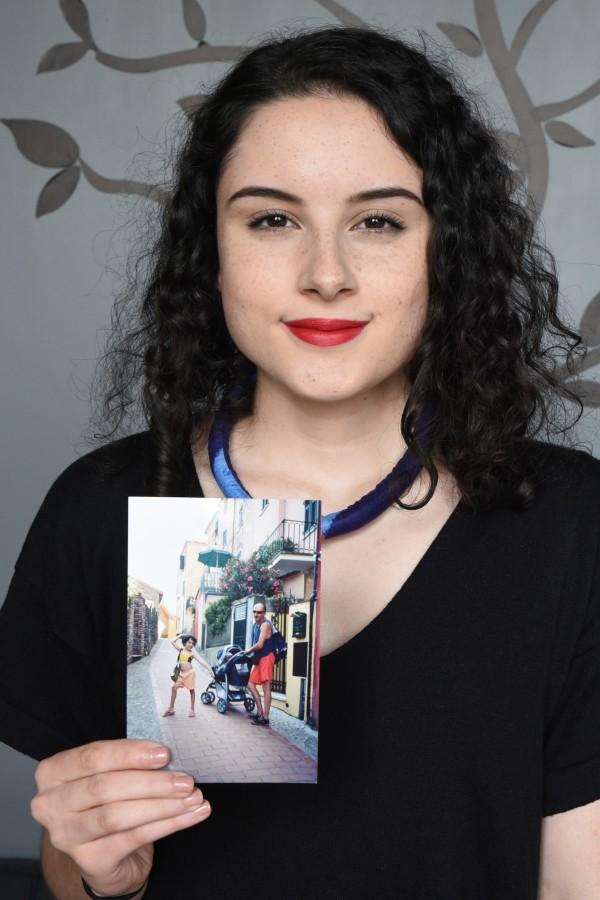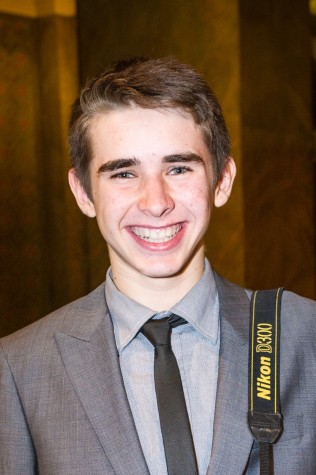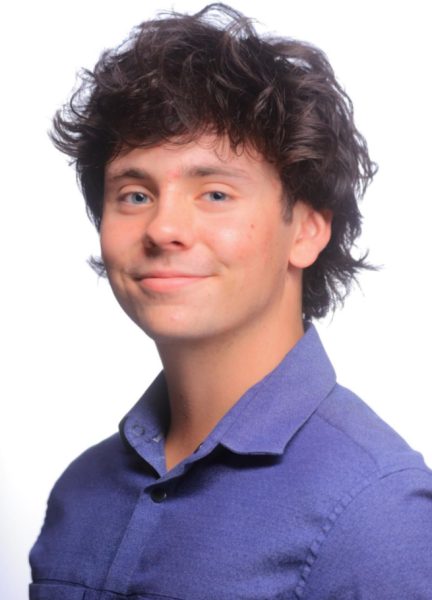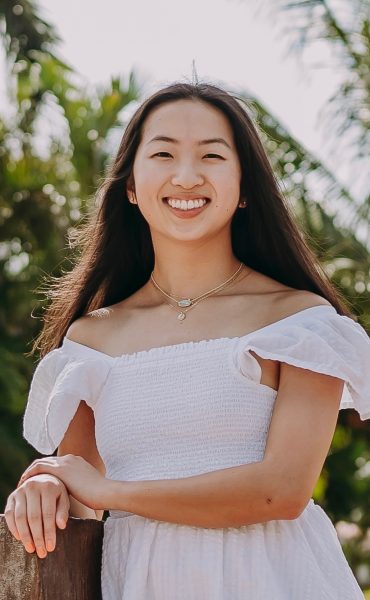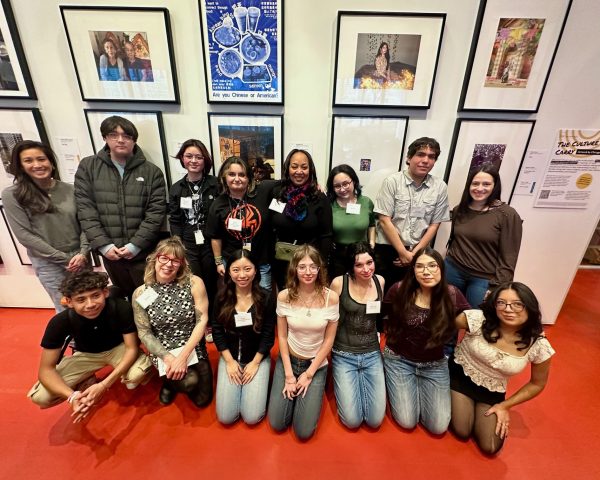Students learn languages from their roots
Julia Comacchio with her father Federico and baby sister Isabel on their way to the beach during a summer holiday back in her home country of Italy.
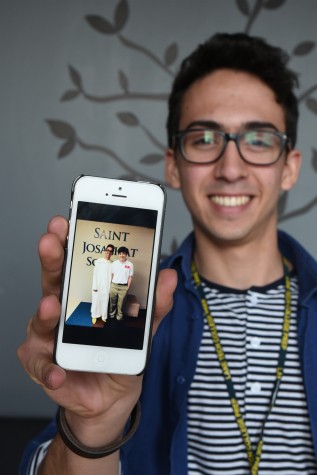
Ali Jebari, with his host brother, Mikey, dressed in traditional Moroccan clothing called jellaba following a presentation on Morocco.

Vica Otrubina shows pride in her homeland, Russia.
Ni hao. Hola. Bonjour. Ciao. Kon’nichiwa. Salve. Guten Tag. They all have the same meaning, hello. Some know the meaning of the greetings, and if they know more than just the greetings in two or more languages, they would be considered bilingual, or multilingual.
Multilingual speakers are those who know more than two languages and continue to learn new languages. They surpass monolingual speakers in the world’s population, and according to quora.com, it’s generally said that more than half of the world speaks two or more languages.
According to the website, ilanguages.org, people who speak several languages are also called polyglots. Morocco is a country known to have more multilinguals and polyglots in higher percentages, and the languages they know in Morocco would be Arabic, French, Spanish, Moroccan, and English.
Ali Jebari, Div. 779, is an exchange student from Morocco, and is fluent in English, French, Arabic, Moroccan, and is learning Spanish at Lane.
The French and Spaniards colonized Morocco in 1912, so they imposed their languages on the people living there. Jebari’s country’s history made it so everyone is at least bilingual.
Learning a new language was never a choice for him, and when he was a child, he learned Arabic and French at the same time.
“In my country, French is pretty much the language of the upper educated people, so if I want to go to a good university or something like that, I ought to know French,” Jebari said.
People who are fluent in more than one language can also get mixed up or confused between the languages they know when speaking.
“When I don’t know a word in that language, I just use the other language I know and try to make it sound like the accent [or word] is legit,” Jebari said.
Jebari said he has moments where he would stutter for a while in French because he has been living in Chicago for eight months and his mind has been set in English.
Jebari is learning Spanish in school and he says that what helps him a lot is already knowing another latin language, French, because they share some similarities.
“I think one of the best techniques to learning a new language is to read, to watch movies, and to do something fun about it,” Jebari said. “I didn’t learn English by doing some boring grammar exercises, I did it by watching movies in English.”
When it comes to what language Jebari thinks in depends on who he is with and where he is.
“If I were to be by myself, my mind would tend to go back to French,” Jebari said. “But since I have to interact with other people now, I’m thinking in English.”
It also depends on what situation he is in, because when he is angry, he thinks in Moroccan rather than Arabic, since it is his first language.
Jebari said he always wanted to learn Chinese because it is the most spoken language in the world, but he believes that it is too late for him to start considering the Chinese language has a whole different alphabet and pronunciation.
When learning a new language, Jebari came upon the same challenge every time. The pronunciation. He learned French and Moroccan first, so when he learns a new language, his French accent will most likely show up.
“What I hate the most is that when I learn a new language, I want to be as genuine in this language [English] as I can be,” Jebari said. “I know right now I don’t have a perfect American accent at all and my French accent is all over the place.”
Victoria Otrubina, Div. 790, was born in Russia, and is fluent in Russian and English. She became fluent in English about five years ago when she came to America.
While Otrubina is at school, she only speaks English, so learning it back at home benefitted her when she came to America. However, at home, she only speaks Russian with her parents.
“Lately, I tend to think a lot less [in Russian] because now that I’m mostly in the school, it’s always English, but when I go home and I speak to my parents, I think in Russian,” Otrubina said. “It depends on where I am.”
She was required to take English back in Russia. Now though, she gets a say in what she wants to learn and at Lane, she chose to learn Latin.
“It’s a dead language, so nobody really speaks it besides the pope, but a lot of languages are formed off of Latin,” Otrubina said. “So I thought ‘hey, if I know Latin, I can understand English better and other languages.’ It’s like the basis for everything.”
Otrubina would like to learn French because she heard that it was a beautiful language and that it has a lot of different rules than English. Learning French is one of the things on her bucket list she wishes to accomplish.
Otrubina believes that the best way to engage in a new language is to jump right into it and not use a dictionary to translate because that will not help learn the language at all. To get the hang of the language and know how to speak it and write it, one has to hear it.
“To learn to speak [a language], you need to learn to hear it, otherwise it’s a really long process,” Otrubina said. “Like here, students take French so they can go to France, they can’t speak French, but when they go and learn how the kids talk, they’re kind of forced to know the language at that point.”
Just because she is fluent in English and Russian does not mean she does not get mixed up with the two, so out of instinct, if someone asks her a question, she will answer in Russian because it is her first language. Or she asks someone a question in Russian and she will think about it in English.
“Or sometimes I dream in Russian and in English and it gets confusing,” Otrubina said.
Speaking back and forth between Russian and English can be tough, especially when Russia has a completely different alphabet, but knowing both languages has its benefits, like meeting new people.
“It helps to communicate with other people, or just start new friendships,” Otrubina said. “People will ask what my accent is and we start to talk, just simple things like that.”
Julia Comacchio, Div. 656, also believes that knowing many languages helps her connect with other people and she says that it affects her train of thought sometimes because she bounces between the three languages she knows fluently, Spanish, Italian, and English.
“For the most part, it is extremely enriching in that I can express myself in so many ways and with so many people,” Comacchio said.
She was born in Italy and is half Puerto-Rican, and up until the age of five, she moved back and forth between the two countries until she settled in America.
The transition from only speaking Italian sand Spanish to also speaking English was fairly easy for Comacchio because her mother was an English speaker and taught her how to speak English.
“From that, I sort of began to enjoy learning languages more and I wanted to learn other languages,” Comacchio said.
Many people who know and can speak Spanish have gone through the same thing Comacchio has gone through when learning English. She would use the Spanish word of the English word she did not know and add an accent to it and at the end add an -a or -o to make it sound English.
Another challenge Comacchio faced was trying to separate her mind in terms of when she would only speak Italian and when she would only speak Spanish.
Comacchio definitely gets the two languages confused at home because both of her parents speak them interchangeably and she sometimes responds in a hybrid of the two.
“Just trying not to mix up those languages [Spanish and Italian] has been my biggest challenge,” Comacchio said. “I think I’ve gotten better at it with experience and by practicing speaking, writing, and reading the languages separately.”
Jebari, Otrubina, and Comacchio all have almost the same advice for when learning a new language; try many different mediums rather than only books.
“Take in all of the culture that you possibly can,” Comacchio said. “And also, watch films, listen to dialogue, the radio, and just try to really immerse yourself in the language.”
Your donations directly fund the Lane Tech student journalism program—covering essential costs like website hosting and technology not supported by our school or district. Your generosity empowers our student reporters to investigate, write, and publish impactful stories that matter to our school community.
This website is more than a publishing platform—it's an archive, a research tool, and a source of truth. Every dollar helps us preserve and grow this resource so future students can learn from and build on the work being done today.
Thank you for supporting the next generation of journalists at Lane Tech College Prep!
Wendy Mendoza is a junior at Lane Tech and this is her first year being on The Warrior. She enjoys reading any types of Young Adult books like The Maze...

